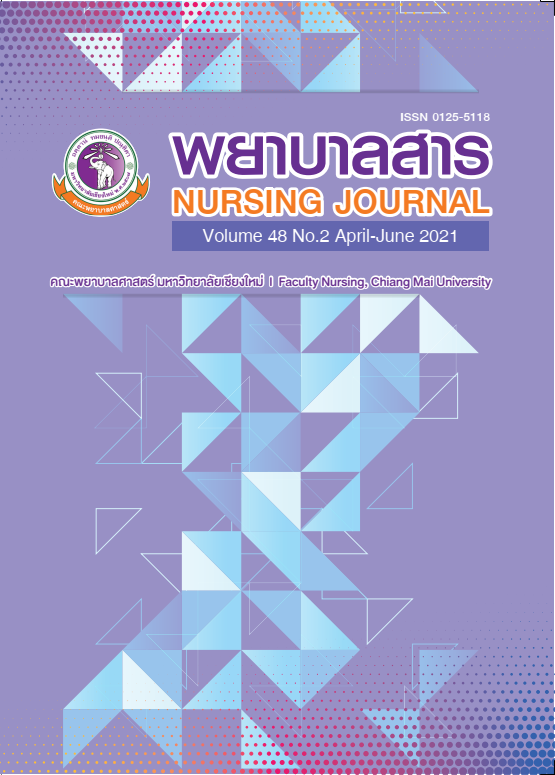Factors Related to Readiness for Hospital Discharge Among Caregivers of Children with Congenital Heart Disease After Cardiac Surgery
Keywords:
Readiness for hospital discharge, Caregivers, Children with congenital heart disease, Cardiac surgery, Related factorsAbstract
Congenital heart disease is commonly found in children. After cardiac surgery, these children need care from their caregivers and caregiver readiness for discharge from the hospital is important. This descriptive correlational study aimed to explore the readiness for hospital discharge among caregivers of children with congenital heart disease after cardiac surgery and the relationship of the characteristics of living, frequency of hospitalization, length of hospitalization, complications, quality of teaching, and care coordination with readiness for hospital discharge. Weiss et al., (2007) was used as the conceptual framework. Participants, purposively selected, were 98 caregivers of hospitalized congenital heart disease pediatric patients in the pediatric wards of 3 tertiary hospitals in the northern region, and one Heart Center in the northeast region. Data were collected from December 2016 to May 2017. The research instruments included the Readiness for Hospital Discharge Scale (RHDS Parent Form), the Quality of Discharge Teaching Scale (QDTS Parent Form), and the Care Coordination Scale. The reliability of the three research instruments was .81, .87, and .85, respectively. Data were analyzed using descriptive statistics, Spearman rank correlation coefficient, and point-biserial correlation coefficient.
The results showed that:
- 1. There was a high level of readiness for hospital discharge among most of the caregivers (79.55%) (= 91.80, SD = 20.11)
- 2. The characteristics of the living, frequency of hospitalization, quality of teaching, and care coordination had a high statistically significant correlation to readiness for hospital discharge (r = .58, .81, .73, respectively, p < .01). In addition, the length of hospitalization had a moderate statistically significant correlation to readiness for hospital discharge (r= .32, p < .01) and complications had a low statistically significant correlation to readiness for hospital discharge (r= .28, p < .01)
The results of this study serve as preliminary data to help nurses better understand the quality of teaching and care coordination to prepare caregivers for readiness for hospital discharge following cardiac surgery for their children.
References
Bernstein, H. H., Spino, C., Lalama, C. M., Finch, S. A., Wasserman, R. C., & McCormick. (2013). Unreadiness for postpartum discharge following healthy term pregnancy: Impact on health care use and outcomes. Academic Pediatrics, 13(1), 27-39.
Berry, J. G., Ziniel, S. I., Freeman, L., Kaplan, W., Antonelli, R., Gay, J., . . . Goldmann, D. (2013). Hospital readmission and parent perceptions of their child's hospital discharge. International Journal for Quality in Health Care, 25(5), 573-581.
Gupta, V. B., O’Connor, K. G., & Quezada-Gomez, C. (2004). Care coordination services
in pediatric practices. Pediatrics, 113(Suppl. 4), 1517-1521.
Hadjistavropoulos, H., Biem, H., Sharpe, D., Bourgault-Fagnou, M., & Janzen, J. (2008). Patient perceptions of hospital discharge: Reliability and validity of a patient continuity of care questionnaire. International Journal for Quality in Health Care, 20(5), 314-323.
Healy, F., Hanna, B.D., & Zinman, R. (2012). Pulmonary complication of congenital heart disease. Peadiatric Respiratory Reviews. Retrieved from https://pubmed.ncbi.nlm.nih.gov/22208788/
Kheiwchaum, R., Thosingha, O., Chayaput, P., & Utriyaprasit, K. (2012). The development of a clinical nursing practice guideline for preparation of caregivers of patients with TBI (Traumatic Brain Injury). Nursing Science Journal of Thailand, 29(1), 18-25. (in Thai) Retrieved from https://he02.tci-thaijo.org/index.php/ns/article/view/2793
Khongphatthanayothin, A. (2009). Congenital heart diseases (1st Ed.). Bangkok:
Amarin Printing & Publishing Public Co. (in Thai)
Kogon, B., Jain, A., Oster, M., Woodall, K., Kanter, K., & Kirshbom, P. (2012). Risk factors associated with readmission after pediatric cardiothoracic surgery. The Annals of Thoracic Surgery, 94(3), 865-873.
Lerret, S. M. (2009). Discharge readiness: An integrative review focusing on discharge following pediatric hospitalization. Journal for Specialists in Pediatric Nursing, 14(4), 245-255.
Niyomka, S., & Meesukkho, J. (2016). Factors predicting readiness for hospital discharge
among caregivers of hospitalized children in tertiary hospital. Nursing Journal, 43(1), 1-11. (in Thai)
Panuthai, S. (2014) Factors affecting readiness for hospital discharge among older persons. Nursing Journal. 41(4), 150-160. (in Thai)
Payomhom, C. (2013) The effect of education program on maternal care for children with congenital heart disease undergone post open-heart surgery. Journal of Cardio-Thoracic Nursing. 24(1), 31-43.
Polit, D. F., & Beck, C. T. (2010). Essentials of nursing research: Appraising evidence for nursing practice (7th ed.). Philadelphia: Wolters Kluwer Health/Lippincott Williams & Wilkins.
Richards, M. K., Yanez, D., Goldin, A. B., Grieb, T., Murphy, W. M., & Drugas, G. T. (2016). Factors associated with 30-day unplanned pediatric surgical readmission. The American Journal Surgery, 212(3), 426-32.
Sittiwangkul, R. (2013). Critical congenital heart diseases in infants. Pediatric Emergencies. 1, 150-160. (in Thai)
Splingaire, J. M. (2005). Readiness for hospital discharge: Predictors and outcomes in NICU Parents. Paper presentation in part of: Rising Stars of Scholarship and Research St. Joseph Regional Medical Center, Milwaukee, WI, USA.
Sriprasong, S. (2011). Personal factors related to perceived readiness for hospital discharge of patients with acute myocardial infarction. Thai Journal of Cardio-Thoracic Nursing, 22(2). 45-57. (in Thai)
Weiss, M., Johnson, N. L., Malin, S., Jerofky, T. A., & Lang, C. (2008). Readiness for discharge in
parents of hospitalized child. Journal of Pediatric Nursing, 23(4), 282-295.
Weiss, M., & Lokken. L. (2009). Predictors and outcomes of postpartum mothers’perceptions
of readiness for discharge after birth. Journal of Obstetric, Gynecologic and Neonatal Nursing, 38(4), 406-417.
Weiss, M., Piacentine, L. B., Lokken, L., Ancona, J., Aecher, J., Gresser, S., et al. (2007).
Perceived readiness for hospital discharge in adult medical-surgical patients. Clinical Nurse Specialist, 21(1), 31-42.
Downloads
Published
How to Cite
Issue
Section
License
บทความที่ได้รับการตีพิมพ์เป็นลิขสิทธิ์ของวารสารพยาบาลสาร
ข้อความที่ปรากฏในบทความแต่ละเรื่องในวารสารวิชาการเล่มนี้เป็นความคิดเห็นส่วนตัวของผู้เขียนแต่ละท่านไม่เกี่ยวข้องกับมหาวิทยาลัยเชียงใหม่ และคณาจารย์ท่านอื่นๆในมหาวิทยาลัยฯ แต่อย่างใด ความรับผิดชอบองค์ประกอบทั้งหมดของบทความแต่ละเรื่องเป็นของผู้เขียนแต่ละท่าน หากมีความผิดพลาดใด ๆ ผู้เขียนแต่ละท่านจะรับผิดชอบบทความของตนเองแต่ผู้เดียว






